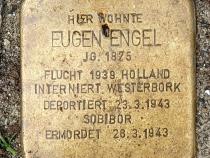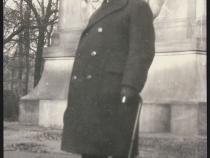Eugen Engel was born on September 19, 1875, in Widminnen, East Prussia. He was the son of businessman Samuel Engel and his wife Bertha. The family, which included Eugen’s five sisters and three brothers, moved to Berlin in August 1892.<br />
<br />
In 1907 in Heilsberg, Eugen, at age 31, married Lea Jacoby. On July 19, 1910, their daughter, Eva Engel, was born.<br />
<br />
Eugen and Lea were married for 22 years until her early death on July 22, 1929, at age 46. Her death was a great loss for Eugen, and he never remarried. Lea is buried at Weissensee Cemetery in Berlin. Eugen had a bench placed in front of her headstone, and he and Eva sat there often. He had these words inscribed on the headstone: “Nun hast du uns den ersten schmerz getan, der aber traf.” Adapted from a poem by Adelbert von Chamisso, these words describe his grief: “You have given us, for the first time, pain.”<br />
<br />
Although Eugen’s daily work was as a businessman, his personal passion was music, as a listener, composer, and friend of musicians. He corresponded with many famous musicians at the time about his music, including Bruno Walter, Wilhelm Backhaus, Engelbert Humperdinck, Leo Blech, and Edwin Fischer.<br />
<br />
Eugen composed lieder and chamber music, and he devoted years to the creation of his opera, Grete Minde, based on Theodor Fontane’s novella of the same name. While new music groups performed some of Eugen’s shorter works for the Berlin public, the cost and organizational barriers to performing any new opera, the turmoil of 1930s Germany, and his Jewish background barred any hope of Grete Minde and his other pieces being heard. However, after decades of silence, in 2013 some of his lieder were performed in California at a private concert.<br />
<br />
Until his emigration to the Netherlands in January 1939, where Eva was already living, Eugen and Eva lived at Charlottenstraße 74-75. The building in which they lived was destroyed in a bombing raid, and the new building that stands at this address today was constructed after the Berlin wall fell.<br />
<br />
Eva had emigrated on July 24, 1935, to Amsterdam, where her childhood friend Max Herbert Löwenberger was living. Max had fled there from Germany after he was fired in 1933 “for business reasons” from the Berlin department store Hermann Tietz. <br />
<br />
Eva and Max married in Amsterdam on August 1, 1935, and their son, Klaus Leopold, was born in 1937. Ten years later, in 1947, their daughter, Janice Ann, was born in San Francisco, California. The family had emigrated there in February 1941 and had changed the family name to Lowen.<br />
<br />
Eugen loved Berlin and was a proud German. However, he finally recognized that the vibrant and cultured country he had cared for so deeply no longer existed. As a result, he too attempted to emigrate to the United States. On January 21, 1939, he moved from Berlin to Amsterdam, living in the same Amsterdam apartment building as Eva and her family.<br />
<br />
Following the German Wehrmacht’s occupation in the Netherlands, Eugen registered with the American Consulate in July 1940 and was placed on the waiting list. There is evidence that he tried to emigrate to Cuba in 1941, when the Cuban embassy in Berlin notified him that he had been granted an entry permit.<br />
<br />
During the years that Eugen stayed in Amsterdam, after Eva, Max, and Klaus had emigrated to the United States, he remained constantly in communication with his daughter. He typed long letters every week from the end of January 1941 until February 1943. When he was no longer allowed to buy a new typewriter ribbon, he wrote his letters by hand. He chronicled his forced moves within Amsterdam, without trying to alarm Eva, and he reported on family and friends who were “nervous” or who ”had gone away.” Eva meticulously saved every letter in a binder.<br />
<br />
Tragically, his efforts to emigrate failed at the last minute. In March 1943, he was deported to the Westerbork camp. His last sign of life, a Red Cross notification dated March 20, 1943, sent to Eva, said: “My dear children I am healthy and well and think of you often. Heartfelt greetings your father Eugen Engel.” On March 23, 1943, he came to Sobibor in a mass transport of 1250 prisoners, where he was murdered three days later at the age of 67, most likely in the gas chamber.<br />
<br />
Eva was crushed upon learning this news. Even though she had successfully started a new life in San Francisco and eventually became an American citizen, her father never left her thoughts. Tragedy struck again when her husband, Max, died in 1949 of natural causes, leaving her to raise two children alone. A decade later she married Hans Dannenberg, another German refugee. Finally, having lived a full life, Eva passed away on February 9, 2006, at the age of 95, much loved by her children and grandchildren.<br />
<br />
Although Eugen Engel did not survive, Eva had been able to bring all of the music he wrote to the United States, including the massive, fully orchestrated score for Grete Minde. His talent and passion for the arts, as well as his devotion to his family, reflect his humanity and integrity, and his surviving family honors his memory.<br />
<br />
<br />
In 1907 in Heilsberg, Eugen, at age 31, married Lea Jacoby. On July 19, 1910, their daughter, Eva Engel, was born.
Eugen and Lea were married for 22 years until her early death on July 22, 1929, at age 46. Her death was a great loss for Eugen, and he never remarried. Lea is buried at Weissensee Cemetery in Berlin. Eugen had a bench placed in front of her headstone, and he and Eva sat there often. He had these words inscribed on the headstone: “Nun hast du uns den ersten schmerz getan, der aber traf.” Adapted from a poem by Adelbert von Chamisso, these words describe his grief: “You have given us, for the first time, pain.”
Although Eugen’s daily work was as a businessman, his personal passion was music, as a listener, composer, and friend of musicians. He corresponded with many famous musicians at the time about his music, including Bruno Walter, Wilhelm Backhaus, Engelbert Humperdinck, Leo Blech, and Edwin Fischer.
Eugen composed lieder and chamber music, and he devoted years to the creation of his opera, Grete Minde, based on Theodor Fontane’s novella of the same name. While new music groups performed some of Eugen’s shorter works for the Berlin public, the cost and organizational barriers to performing any new opera, the turmoil of 1930s Germany, and his Jewish background barred any hope of Grete Minde and his other pieces being heard. However, after decades of silence, in 2013 some of his lieder were performed in California at a private concert.
Until his emigration to the Netherlands in January 1939, where Eva was already living, Eugen and Eva lived at Charlottenstraße 74-75. The building in which they lived was destroyed in a bombing raid, and the new building that stands at this address today was constructed after the Berlin wall fell.
Eva had emigrated on July 24, 1935, to Amsterdam, where her childhood friend Max Herbert Löwenberger was living. Max had fled there from Germany after he was fired in 1933 “for business reasons” from the Berlin department store Hermann Tietz.
Eva and Max married in Amsterdam on August 1, 1935, and their son, Klaus Leopold, was born in 1937. Ten years later, in 1947, their daughter, Janice Ann, was born in San Francisco, California. The family had emigrated there in February 1941 and had changed the family name to Lowen.
Eugen loved Berlin and was a proud German. However, he finally recognized that the vibrant and cultured country he had cared for so deeply no longer existed. As a result, he too attempted to emigrate to the United States. On January 21, 1939, he moved from Berlin to Amsterdam, living in the same Amsterdam apartment building as Eva and her family.
Following the German Wehrmacht’s occupation in the Netherlands, Eugen registered with the American Consulate in July 1940 and was placed on the waiting list. There is evidence that he tried to emigrate to Cuba in 1941, when the Cuban embassy in Berlin notified him that he had been granted an entry permit.
During the years that Eugen stayed in Amsterdam, after Eva, Max, and Klaus had emigrated to the United States, he remained constantly in communication with his daughter. He typed long letters every week from the end of January 1941 until February 1943. When he was no longer allowed to buy a new typewriter ribbon, he wrote his letters by hand. He chronicled his forced moves within Amsterdam, without trying to alarm Eva, and he reported on family and friends who were “nervous” or who ”had gone away.” Eva meticulously saved every letter in a binder.
Tragically, his efforts to emigrate failed at the last minute. In March 1943, he was deported to the Westerbork camp. His last sign of life, a Red Cross notification dated March 20, 1943, sent to Eva, said: “My dear children I am healthy and well and think of you often. Heartfelt greetings your father Eugen Engel.” On March 23, 1943, he came to Sobibor in a mass transport of 1250 prisoners, where he was murdered three days later at the age of 67, most likely in the gas chamber.
Eva was crushed upon learning this news. Even though she had successfully started a new life in San Francisco and eventually became an American citizen, her father never left her thoughts. Tragedy struck again when her husband, Max, died in 1949 of natural causes, leaving her to raise two children alone. A decade later she married Hans Dannenberg, another German refugee. Finally, having lived a full life, Eva passed away on February 9, 2006, at the age of 95, much loved by her children and grandchildren.
Although Eugen Engel did not survive, Eva had been able to bring all of the music he wrote to the United States, including the massive, fully orchestrated score for Grete Minde. His talent and passion for the arts, as well as his devotion to his family, reflect his humanity and integrity, and his surviving family honors his memory.




